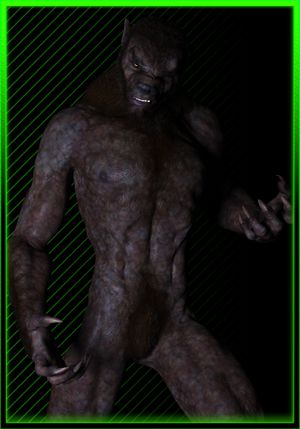Werewolf

| Name | Werewolf |
| Race | Human |
| Type | Lycanthrope |
| Faction | Independent |
| Premiere | Desideratum: Blood Bonds |
| Relative(s) | None Applicable |
In folklore, a werewolf (Old English: werwulf, “man-wolf”), or occasionally lycanthrope /ˈlaɪkənˌθroʊp/ (Greek: λυκάνθρωπος lukánthrōpos, “wolf-person”), is a human with the ability to shapeshift into a wolf (or a therianthropic hybrid wolf-like creature, either purposely or after being placed under a curse or affliction (often a bite or scratch from another werewolf) with the transformations occurring on the night of a full moon. Early sources for belief in this ability or affliction, called lycanthropy /laɪˈkænθrəpi/, are Petronius (27–66 A.D.) and Gervase of Tilbury (1150–1228 A.D.). In reality, werewolves are monsters of nature itself and roam virtually any and every piece of wilderness on Earth. They were originally followers of a wolf god, similar to Ophion, the snake god. However, their god has long vanished, and its children have spread around the globe. There are other therianthropic creatures in the world which would be compared to werewolves, but they are specifically canine and wolf-like in nature. They have an inherent weakness to silver, and a silver bullet truly can kill them in a single shot. Contrary to folklore, they do not change at a full moon and, in fact, they never do change. Therefore, a werewolf is not a lycanthrope. For example, the namesake of lycanthropy, Lycaon himself, is not a werewolf and can change between human and beast form at will. Absinthe Van Gothen fought werewolves in Portland, Oregon’s Forest National Park when she followed the Night Stalkers, Sani Lightfoot and Katerina Mordova, who were there to combat the plague witch Baba Yaga and her forces.